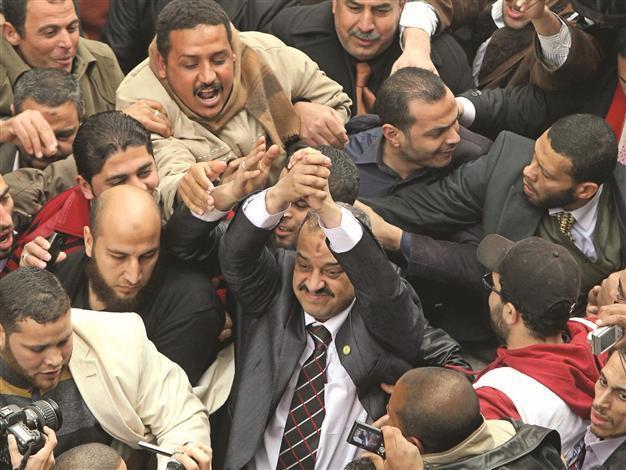Brotherhood in Egypt looks to widen influence
CAIRO

Muslim Brotherhood member of parliament Mohammed Beltagi (C) is surrounded by supporters upon his arrival for the body’s first session since the ousting of Mubarak. The group is considering running its own candidate in the presidential elections. AFP photo
The Muslim Brotherhood is considering running its own candidate in the May 23-24 presidential elections, dropping its previous decision to avoid direct participation in the race, the party has announced.
If the Brotherhood fields a candidate and wins the presidency, the group would control the two main branches of power. In parliamentary elections, the first since a popular uprising unseated President Hosni Mubarak last year, it won nearly half the seats. Since then, the Brotherhood has sought to allay fears of local liberals and
Egypt’s Western allies about an
Islamist takeover, by saying it would not field its own candidate for president. The group also fears that the move may trigger a harsh response by the country’s military rulers.
Mahmoud Hussein, the Brotherhood’s general secretary, told the Associated Press on March 21 that his group was “forced to consider the option of fielding a candidate from its own ranks.”
Army pressureHowever, he also revealed that the generals were working behind the scenes to persuade presidential candidates to turn down Brotherhood support.
“When we reach out to some people, they either refuse because they feel they are not up to the mission, or they come under pressure from the military council,” he said. He declined to give names. Another factor is younger Brotherhood members disobeying the group’s leadership by supporting a former Brotherhood leader, Abdel-Moneim Abolfotoh, who was expelled from the movement after he announced his decision to join the race.
Abolfotoh, a strong presidential hopeful, also has the backing of some liberals, who see him as a reformer. Another candidate, Amr Moussa, who had served as the country’s foreign minister under Mubarak, is seen as the front-runner because of his name recognition, but is considered too secular by the Brotherhood’s leaders.
For the Muslim Brotherhood, to field a candidate after expelling Abolfotoh for defying its ban on running would be seen as a double standard, said Essam Sultan, a lawmaker from the Wasat (Centrist) Party. “The Brotherhood is in real crisis over the tremendous support Abolfotoh has among its youth, but it will be in a double crisis if tries to solve this by fielding [another candidate],” Sultan said.
The Brotherhood’s deputy chairman, Khairat el-Shater, has been mentioned in local media as a possible candidate. However, some warn the group against taking too much on itself, just a year after it emerged from decades of operating in the shadows as an illegal organization. “It would be a fatal mistake, because they would be faced with huge challenges,” said Mohammed Habib, a former deputy leader of the group who quit last year, citing the group’s undemocratic policies.
